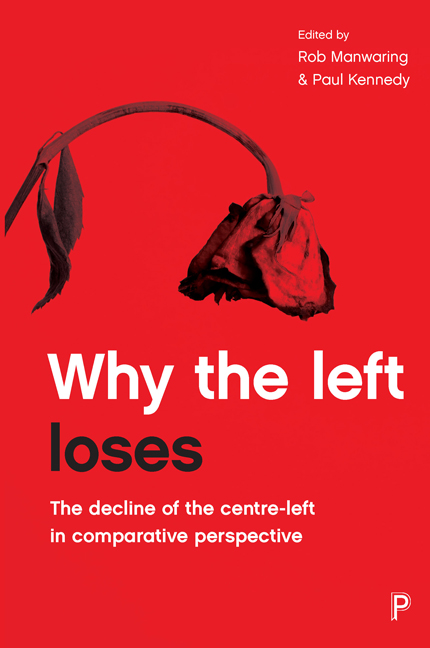Book contents
seven - Germany: little hope in times of crisis
Published online by Cambridge University Press: 08 April 2022
Summary
Introduction
For many years, the Social Democratic Party (SPD) has performed poorly at the German parliamentary (Bundestag) elections (see Table 7.1), and crucially, has been unable to puncture the dominance of the CDU/CSU (Christian Democratic Union/Christian Social Union). From the period when Sigmar Gabriel became party leader in October 2009 until 2017, the SPD has rarely achieved more than 30 per cent at the polls. At the 2013 elections the SPD obtained only 25 per cent of the vote, and there has been no subsequent improvement on that already modest level. The reasons for this poor performance are complex and outlined in this chapter. In line with the other case chapters in this volume, this chapter considers the institutional, ideational/ programmatic and individual/agency dimensions of the SPD's plight.
The SPD is facing a range of problems, on numerous fronts. Programmatically, the SPD lacks a vision for society that is sufficiently coherent and forward-looking to attract voters. For some time now, it has become apparent that the SPD lacks a viable, comprehensive, social democratic project capable of securing the support of a sufficiently sizeable proportion of the electorate. Instead, since 1998 (apart from the period between 2009 and 2013), the SPD has adopted a form of electoral pragmatism in government. On the positive side, this has made a major contribution to the stability of the German political system, but also given a social democratic hue to government policy. However, the SPD's input has not increased the party's popularity; on the contrary, the SPD's popularity has continued to decline.
The SPD's credibility has declined over the last two decades largely due to a combination of its failure to implement campaign promises and the difficulties it has experienced while seeking to address its tarnished legacy of office in the periods after 1998 and 2009. The party's organisational structures are also characterised by an ageing, declining membership. Moreover, changes in party competition have restricted the SPD's margin of manoeuvre over recent years. Indeed, the convergence of the SPD and CDU on numerous policies has allowed a left-wing party (Linkspartei) and a Green party (Bündnis ‘90/ Die Grunen) to occupy the available space on the left.
- Type
- Chapter
- Information
- Why the Left LosesThe Decline of the Centre-Left in Comparative Perspective, pp. 103 - 122Publisher: Bristol University PressPrint publication year: 2017

